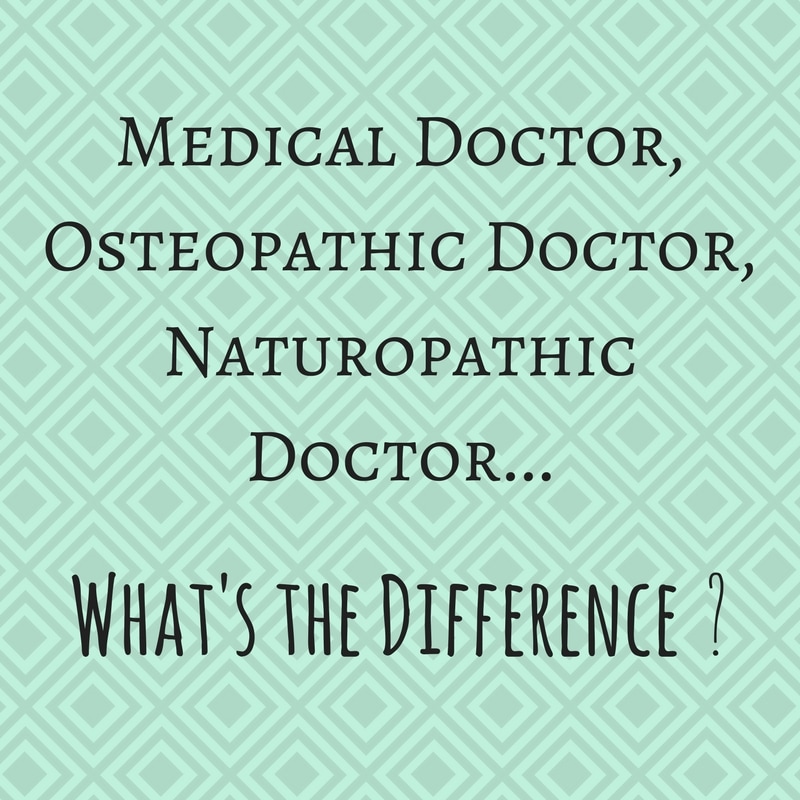 Most all of us have been cared for by a medical doctor (M.D.). These physicians attend traditional, allopathic medical schools, which focus on treating symptoms and conditions with pharmaceuticals and physical interventions like surgery. Some M.D.s decide after completing medical school that they would like to learn about nutrition and disease prevention. These doctors receive additional training by their own initiative. Many of them call themselves functional medicine practitioners and are listed on www.functionalmedicine.org. Some call themselves holistic physicians and are listed on www.holisticmedicine.org. My children's pediatrician is a holistic physician. She's an M.D. but she offers natural remedies in addition to pharmaceuticals. I found her through Dr. Sears' vaccine-friendly pediatrician list. You may have been cared for by an osteopathic doctor (D.O.) and simply assumed it was an M.D. They practice alongside M.D.s in hospitals and doctors' offices and have the same qualifications. Osteopathic doctors can choose any specialty, prescribe drugs, perform surgeries, practice anywhere in the United States, and can own a medical practice. The main difference between the two is that while D.O.s learn the same content as M.D.s, D.O.s attend medical schools that promote overall wellness and disease prevention. From the first day of medical school D.O.s are taught to view the body as much more than a collection of individual organ systems that may become diseased. They understand that if one organ system is diseased, the whole body is out of balance. I usually prefer to see a D.O. instead of an M.D. because it's more likely that the D.O. will consider alternative treatments. For example, my former endocrinologist was a D.O. and she was willing to prescribe Armour Thyroid, a natural porcine-derived thyroid hormone replacement. Most M.D.s will only prescribe synthetic forms of thyroid hormone, such as Synthroid or Levoxyl. My primary care physician is also a D.O., and I have noticed that he doesn't simply focus on my symptoms. Instead, he discusses with me his thoughts as he attempts to determine the causes of my symptoms. He's also not drug-happy, although he does recommend them if he feels they are absolutely necessary. But beware; I've seen other D.O.s who seem no different than a typical what're-your-symptoms-here's-your-medication doctor. This is because pre-med students sometimes choose to attend osteopathic medical schools based on affordability or proximity, and not necessarily because they have a desire to focus on overall wellness. You have probably not been treated by a naturopathic doctor (N.D.) without knowing it. Naturopathic doctors work with nature to restore health and they usually do not prescribe drugs or administer vaccines. In 1902 the first class of N.D.s graduated from American School of Naturopathy in New York, the first naturopathic medical school in the United States. It was founded by Dr. Benedict Lust, who was cured of tuberculosis by natural means. His hope was to train doctors to integrate the practice of natural methods such as botanicals, nutrition, accupuncture, homeopathy, and maniupulative therapy. Naturopathic medical students receive the same training as M.D.s and D.O.s., and are often taught by the same professors who teach at allopathic and osteopathic medical schools. The difference is the philosophy and the additional training that N.D.s receive in natural therapies. Naturopathic doctors are licensed in the following states and U.S. territories: Alaska, Arizona, California, Colorado, Connecticut, District of Columbia, Hawaii, Idaho, Kansas, Maine, Minnesota, Montana, New Hampshire, North Dakota, Oregon, Utah, Vermont, Washington, Puerto Rico, and Virgin Islands. Naturopathic doctors do practice in other states, but insurance will not usually cover the visit. If you live in a state that does not license N.D.s, be careful that you know the difference between someone who graduated from a licensed medical school and someone who has completed a certificate in natural medicine and is calling himself a naturopathic doctor. It is not illegal to call yourself a naturopathic doctor in states where the profession is not licensed. If you plan to see a N.D. I recommend you find one through the American Association of Naturopathic Physicians Website. This is not to say, however, that those who complete health-related certificate programs are unable to help you, but if you'd like to find a N.D. who has attended a licensed medical school, use the AANP website.
2 Comments
My husband is a D.O., and one main difference between D.O.s and M.D.s is that D.O.s are taught spinal manipulation (like chiropractors) on top of everything else that M.D.s learn. This makes D.O.s preferable in certain specialties because they have another "tool" in their arsenal to help with pain. I had a D.O. as my primary care physician for years, and once when I hurt my shoulder, he was able to give me an adjustment to help with the pain instead of just prescribing pain relievers/muscle relaxers, which might have helped the pain but not treated the cause. I'm kind of spoiled now, because my husband is able to give me adjustments at home. :)
Reply
Wow! I was reading your site (looking for recipes and fun kids activities) and found your blog post about ND's versus DO's and MD's - I'm so happy that you wrote about it!
Reply
Your comment will be posted after it is approved.
Leave a Reply. |
